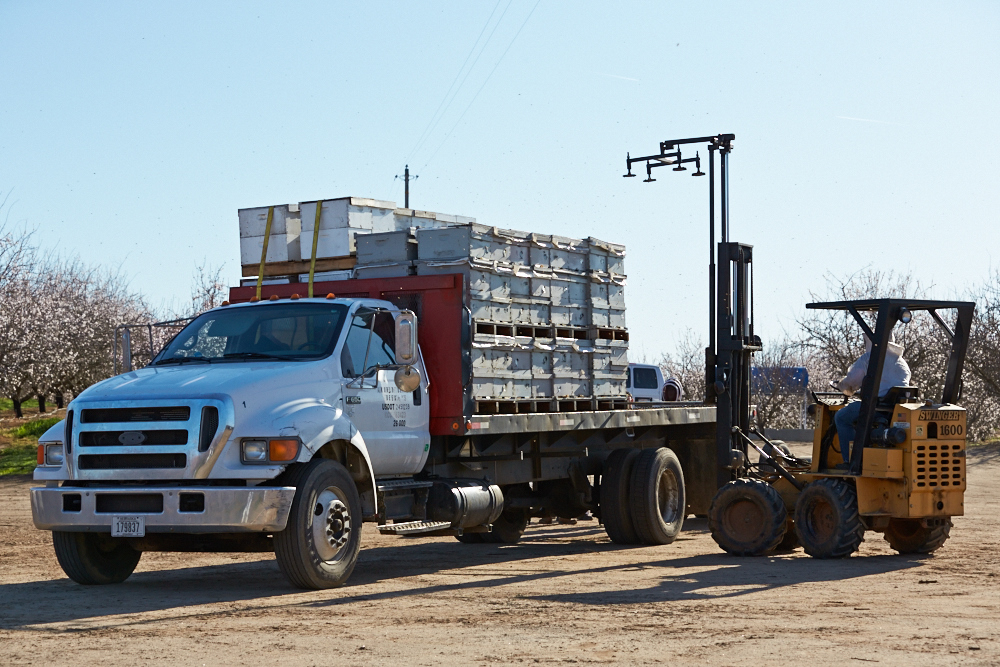 From the private sector to state and federal entities, the Almond Board of California is actively sharing the industry’s long-standing commitment to honey bee health with those in the private sector and state and federal entities. During these discussions, the Almond Board speaks to growers’ efforts to ensure almond orchards remain a good, safe place for honey bees as well as the industry’s extensive honey bee research.
From the private sector to state and federal entities, the Almond Board of California is actively sharing the industry’s long-standing commitment to honey bee health with those in the private sector and state and federal entities. During these discussions, the Almond Board speaks to growers’ efforts to ensure almond orchards remain a good, safe place for honey bees as well as the industry’s extensive honey bee research.
In early April, the Almond Board’s Bob Curtis, director of Agricultural Affairs, along with honey bee queen breeder Jackie Park Burris, who represented the California State Beekeepers Association, spoke at a Senate Ag Committee hearing focused on honey bee health. During the hearing, these two covered various issues impacting bees on behalf of both the almond and beekeeping industries. Key among these issues were the following:
| 1. |
Efficient border station clearance |
| |
|
| |
Currently, bee shipments that carry quarantine pests are rejected at the California border and must be cleaned and/or reconditioned before being accepted for re-entry at border protection stations. Any rejected shipments must be cleaned off-site, return to the border station and then be re-inspected in order to enter California. This extra travel step led to substantial delays of up to two to three days during the 2018 pollination season, and also caused negative impacts on bee health. |
| |
|
| |
For beekeepers, an important goal to aim for is to ensure loads are cleaned before their departure to California. However, in the event that pests are detected, several options, including additional funding, have been proposed under a “Bee Safe” initiative to clean and clear the loads in a more expeditious manner. |
| |
|
| 2. |
Increase honey bee forage on state and federal lands in California |
| |
|
| |
Research shows that properly nourished honey bees — those with a diverse diet — are better able to fend off stressors such as pests and parasites, leading to stronger hives. Many almond growers are finding that providing cover crop forage in orchard middles or in nearby fields improves the diet of pollinators and also improves pollination. Under the Bee Safe initiative, provisions and funding have been proposed to identify additional opportunities for beekeepers to place their hives on state and federal lands where forage resources are available. |
| |
|
| 3. |
Hive registration with County Ag Commissioners |
| |
|
| |
Beekeepers are required to register their hives with County Ag Commissioners at the beginning of each year. This necessary step allows beekeepers to be notified when pesticide applications are planned within one mile of their hives. These notifications are key to minimizing bee exposure to pesticides and preserving bee health. Legislation and budget proposals have been made under the Bee Safe program to strengthen registration enforcement and program management. |
| |
|
Next steps
Building on the good work of Curtis and Park Burris, Almond Alliance of California and California State Beekeepers Association sponsored an augmentation to the California Department of Food and Agriculture (CDFA) Bee Safe budget change proposal to be included in the governor’s proposed budget. Additional funding would address the above issues and others, such as hive theft, and these issues would be reported to CDFA, County Ag Commissioners and rural crime task forces. The items were held open pending release of the governor’s May revise.